

When TED Lost Control of Its Crowd. Photography: Curtis Steinback.
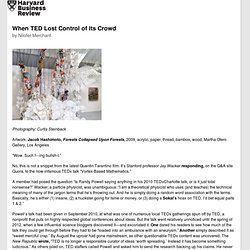
Ye olde Abenomics. Researchers develop solar-to-fuel roadmap for crystalline silicon. Bringing the concept of an “artificial leaf” closer to reality, a team of researchers at MIT has published a detailed analysis of all the factors that could limit the efficiency of such a system.

The new analysis lays out a roadmap for a research program to improve the efficiency of these systems, and could quickly lead to the production of a practical, inexpensive and commercially viable prototype. Such a system would use sunlight to produce a storable fuel, such as hydrogen, instead of electricity for immediate use. This fuel could then be used on demand to generate electricity through a fuel cell or other device. This process would liberate solar energy for use when the sun isn’t shining, and open up a host of potential new applications.
The device combines two technologies: a standard silicon solar cell, which converts sunlight into electricity, and chemical catalysts applied to each side of the cell. L'Afrique, nouvelle fabrique de millionnaires. CBA gets green light to swallow Aussie. FSC's John Brogden: listen to ASIC’s life insurance churn warning. ASIC bans broker for dishonest conduct. ASIC has permanently banned a Sydney insurance broker from providing financial services after an investigation found he engaged in dishonest conduct.

Ronald Coshott, of Edgecliff, New South Wales, was the director and sole responsible officer of Bay Pacific Insurance Brokers. Op puts insurance arm up for sale amid £703m loss. Op sacrifices insurance to save branch deal. Council ponders childcare plan for theatregoers. Rachel Healy and the City of Sydney are looking at ways of encouraging people to attend cultural events.
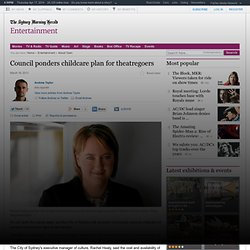
Photo: Greg Newington It's not quite the nanny state, but the City of Sydney will consider introducing evening childcare for parents who want a night at the theatre. The idea is contained in a discussion paper released by the council as part of the development of its first-ever cultural policy. The City of Sydney's executive manager of culture, Rachel Healy, said the cost and availability of childcare was a barrier to parents taking part in the city's various cultural events. "What we're trying to do is open up a conversation about what stops you attending the things you love," she said. Advertisement. Dollar open: Reserve Bank scheme news pushes kiwi. Last updated 10:00 20/03/2013 The New Zealand dollar lost ground against the greenback overnight, after investors were spooked by news of a Reserve Bank scheme which would mean a partial loss on all deposits if a bank fails.
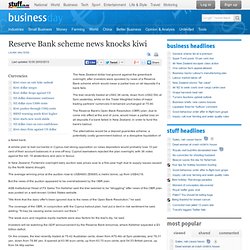
The kiwi recently traded at US82.36 cents, down from US82.59c at 5pm yesterday, while on the Trade Weighted Index of major trading partners' currencies it remained unchanged at 75.90. The Reserve Bank's Open Bank Resolution (OBR) plan, due to come into effect at the end of June, would mean a partial loss on all deposits if a bank failed in New Zealand, in order to fund the bank's bailout. The alternatives would be a deposit guarantee scheme, a potentially costly government bailout, or a disruptive liquidation of a failed bank. A similar plan to bail out banks in Cyprus met strong opposition on news depositors would probably lose 10 per cent of their account balances in a one-off levy.
Australia's coup culture. 20 March 2013Last updated at 17:32 ET By Nick Bryant BBC News, Sydney Julia Gillard and her predecessors: Kevin Rudd (main picture), Kim Beazley (top right) and Paul Keating (bottom right) Australia has one of the most brutal political cultures in the democratic world, in which party leaders are dispatched with abandon.
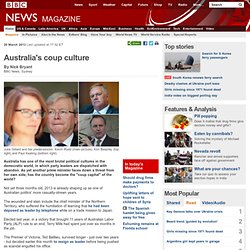
As yet another prime minister faces down a threat from her own side, has the country become the "coup capital" of the world? RBA Edley Financial System in Post-crisis Environment. Malcolm Edey Assistant Governor (Financial System) Remarks to the Australian Centre for Financial Studies (ACFS) and Financial Services Institute of Australasia (Finsia) Leadership Luncheon Series Melbourne - 22 March 2013 I want to talk today about how the financial system has changed in the post-crisis environment.
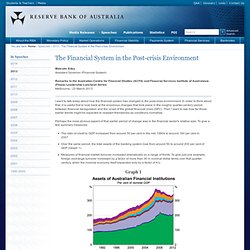
In order to think about that, it is useful first to look back at the enormous changes that took place in the roughly quarter-century period between financial deregulation and the onset of the global financial crisis (GFC). Then I want to ask how far those earlier trends might be expected to reassert themselves as conditions normalise.
Perhaps the most obvious aspect of that earlier period of change was in the financial sector's relative size. The ratio of credit to GDP increased from around 50 per cent in the mid 1980s to around 160 per cent in 2007. Le grand découplage entre la Bourse et l'économie réelle. Depuis le second semestre 2012, les marchés financiers ont connu une forte reprise dans le monde entier.
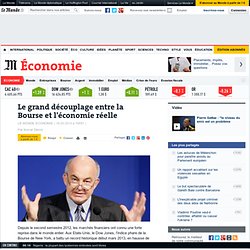
Aux Etats-Unis, le Dow Jones, l'indice phare de la Bourse de New York, a battu un record historique début mars 2013, en hausse de près de 9 % par rapport au mois de septembre précédent. En Europe, les "armes du mois d'août" du président de la Banque centrale européenne (BCE), Mario Draghi, se sont révélées particulièrement efficaces ; il a relégué aux oubliettes la baisse de la monnaie unique, en promettant des achats potentiellement illimités d'obligations des Etats membres de la zone euro. Entre le 1er septembre 2012 et le 22 février, l'indice FTSEurofirst a augmenté de près de 7 %. Australia's cotton-wool wrecking ball. Policy imperils $530m energy funds. Strategy & Operations. Deloitte’s inaugural Business Trends report takes a closer look at eight emerging forces that are influencing how organizations’ think about their strategy.
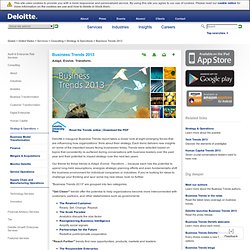
Each trend delivers new insights on some of the important issues facing businesses today. Not 'the economy, stupid' but the budget, idiots. RBA quietly increases banks’ bailout buffer. The Reserve Bank’s move means “our banks can’t run out of cash’.
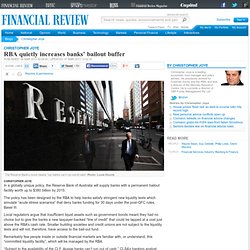
Photo: Louie Douvis Christopher Joye In a globally unique policy, the Reserve Bank of Australia will supply banks with a permanent bailout facility worth up to $380 billion by 2015. Dangerous word games over solvency. Christopher Joye The Reserve Bank of Australia undermines its own credibility when it invents new definitions of essential legal and commercial concepts like “solvency” that mislead the public about the value and purpose of the expansive liquidity support it provides private banks. On Tuesday the RBA’s governor, Glenn Stevens, claimed that the new, globally unique, and ultra-cheap funding facility it will offer banks was “not a ‘bailout’ fund”. “‘Bailouts’ usually mean stumping up public funds to inject capital to an institution whose solvency is in question. RBA opens Pandora’s crisis line. Christopher Joye The Reserve Bank of Australia’s unique Committed Liquidity Facility – a little-known, taxpayer-backed “line of credit” to help banks overcome solvency crises – creates as many problems as it is intended to address.
And it is not clear officials have thought these through. The RBA claims there is a difference between an “illiquid” and an “insolvent” bank, and the new facility, which could be as large as $380 billion, will be made available only to “solvent” institutions. Yet its definition of solvency conflicts with that under the Banking Act and Corporations Act. Panic-driven austerity in the Eurozone and its implications. Southern Eurozone countries have been forced to introduce severe austerity programs since 2011. Frédéric Lordon: « l'Union Européenne a laissé ses banques faire n'importe quoi » Cyprus crisis: The four scenarios. Climate Change and Rising Food Prices Heightened Arab Spring.
If the Arab Spring taught us something, it is that the effects of climate change can serve as stressors, contributing to regional instability and conflict, experts said. In a report published last week, researchers from the Center for American Progress, the Center for Climate and Security and the Stimson Center examined the role of climate change in the Middle East's upheaval during 2010 and 2011. Looking at long-term trends in rain, crops, food prices and migration, they were able to determine how these factors contributed to social instability in the region. "The Arab Spring would likely have come one way or another, but the context in which it did is not inconsequential. Global warming may not have caused the Arab Spring, but it may have made it come earlier," the report says.
The Middle East and North Africa region is extremely vulnerable to fluctuations in food supplies and prices. Ageing population the world’s ‘real problem’ China furious at ‘manipulation’ of iron ore prices. New international land deals database reveals rush to buy up Africa. In a drab Shanghai office block, Unit 61398, China’s cyberwarriors, hack heart of the West. China blames manipulation for iron ore price surge. Everything You Need To Know About ‘Abenomics’ — The Japanese Economic Experiment That’s Captivating The World. Photo: AP There’s a new government in Japan, and it appears determined to finally do “whatever it takes” to attempt to revive the moribund Japanese economy, which has struggled with deflation for a decade. The plan – called “Abenomics,” named after newly-elected Prime Minister Shinzō Abe – is three-fold.
It involves a massive increase in fiscal stimulus through government spending, a massive increase in monetary stimulus through unconventional central bank policy, and a reform program aimed at making structural improvements to the Japanese economy. In short, “Abenomics” amounts to one of the biggest economics experiments the modern world has ever seen. Financial markets are loving it. Géopolitique des terres rares. LE 13 mars 2012, les Etats-Unis, l’Union européenne et le Japon ont déposé une plainte devant l’Organisation mondiale du commerce (OMC) du fait des limitations imposées par la Chine à l’exportation de 17 métaux indispensables à la fabrication des produits de haute technologie, communément appelés « terres rares ».
Pour faire simple, les « terres rares » sont un groupe de métaux aux propriétés voisines comprenant le scandium21Sc, l’yttrium39Y et les quinze lanthanides de la classification périodique des éléments. Ces métaux sont assez répandus dans l’écorce terrestre. Leur nom vient du fait qu’on les a découverts au début du XIXe siècle avec d’autres minerais ; d’où le nom de « terres ». « Terres rares » signifierait plutôt « minerais rares » du fait de leur exploitation difficile. Ils sont en effet très peu concentrés dans les couches géologiques terrestres. Américains, Européens et Japonais s’en remettent donc à la procédure contentieuse de l’OMC. Pourquoi cette plainte ? Chris Martenson Warns "Market Risks Today Are Higher than Ever"
JPMorgan On The Inevitability Of Europe-Wide Capital Controls. Is China Heading For Its Own Arab Spring? As Cyprus Collapses, It's A Race To The Mediterranean Gas Finish Line. Marius Kloppers $75m Handshake. Dow Jones high should not be mistaken for growth in the US economy. Bilingualism: Pitch perfect. Record-High Antibiotic Sales for Meat and Poultry Production. IBM’s supercomputer: Jeopardy was too easy, time to cure cancer.
The Companies and Countries Losing Their Data - Sarah Green - Our Editors. National Broadband Network satellites to take off in $300m deal with French company Arianespace. ++ Ford crée la première publicité qui rend les péages d'autoroutes gratuits.